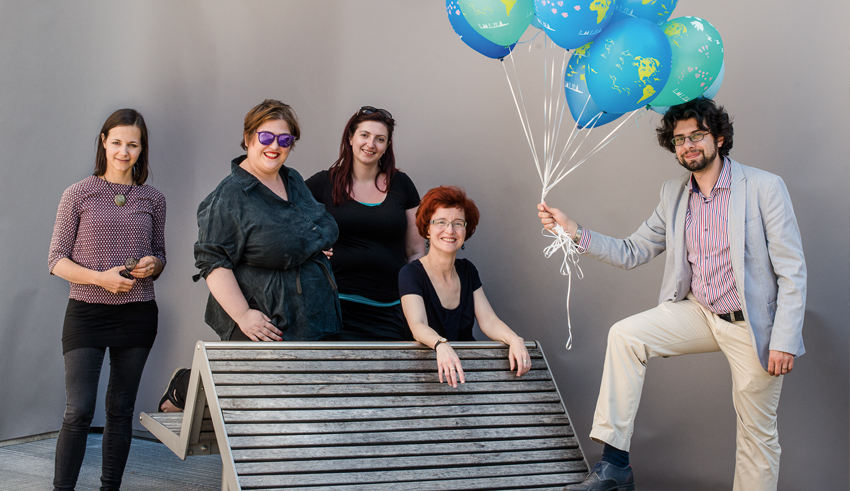The mobility programme Erasmus, in which the mdw has been a participant since the 1993/94 academic year, was set up in 1987 by the Council of the European Union and is therefore now celebrating 30 years of existence.

While the programme’s focus was originally on student exchange (in other words, semesters abroad for mdw students and semesters at the mdw for foreign students), recent years have seen the addition of teacher mobility as well as professional development opportunities at foreign universities for administrative employees. The past few years have also seen the number of the mdw’s Erasmus (+) partner institutions constantly increase, with a current total of over 150 active programme partnerships all over Europe as well as successful and frequent one-off cooperative projects. The number of foreign students studying at the mdw is continually on the rise, and the mdw is also an extremely popular mobility destination for professional development activities. In the following, retired mdw employee Rudolf Pietsch provides mdw Magazine with a look into his own personal experiences with Erasmus.
In the Spirit of the “First Consciously European Man”
Leading a heterogeneous—and, above all, culturally multi-layered—community of states like the European Union in a spirit of peaceful coexistence is something akin to squaring the circle. The economic characteristics and historically rooted contradictions of this complex conglomerate’s member states are too disparate for one to be able to speak of a predestined union. So though a large part of the populace now views the idea of a united Europe primarily as a peace project, the original concept of an economic community is of equal importance. An exchange of values and/or their reconciliation can take place only via mutual familiarity and understanding. Erasmus, as a facilitator of student and instructor exchange that has had many predecessors and itself gone through several stages of development, has worked both consistently and successfully to achieve the most conflict-free coexistence within the European Union that is possible based on the transfer of pre-existing knowledge and new research.
During several decades that I spent working as an assistant at the mdw’s Department of Folk Music Research and Ethnomusicology, I was repeatedly able to take advantage of the teacher mobility made possible by Erasmus+. And when I now look back on these teaching and research stays in places like Cagliari, Lucerne, Klaipeda, Odense, Oslo, Riga, Vilnius, and Zagreb from the vantage point of my retirement, I remember these activities abroad as having been enjoyable and successful in every respect. While small conferences frequently leave almost no time to learn about a country and its people in any kind of depth, with the schedule often even being too tight to engage in much small talk, Erasmus+ makes it possible to become more deeply acquainted with a partner institution. This programme offers sufficient latitude to deal in an involved way with the ideas, thoughts, knowledge, and abilities of the instructors and students at one’s destination. And at my own destinations, I was always hosted with particular friendliness: from individual tours through the institutions I was visiting to extensive and instructive walks through the respective cities and their environs to opportunities to take in concerts, opera performances, and all sorts of other events, studies in archives and at instrument-making workshops, and much more, besides! For me, though, working together with the students on location was always the highlight—and my own curiosity about the countries I was visiting was typically mirrored by the interest shown by the people there, above all from student circles. What’s more, colleagues from the countries I had visited paid return visits to the mdw several times. The ongoing excellent and tireless work of all those individuals across the EU who are employed by ERASMUS can be seen in an example I experienced that involves Lithuania: in 2007, at the initiative of Kristina Valentonienė, a one-week exchange of students took place between the LMTA (Lithuanian Academy of Music and Theatre) and my seminar at the Department of Folk Music Research and Ethnomusicology. Several years later, in 2015, a joint project—which had developed out of the Folk Music Practicum—took place between LMTA and mdw students in the form of a five-day concert tour to Vilnius and Kaunas. And during the current summer semester, a group from the LMTA is visiting the mdw.
So in the spirit of this most important EU exchange project’s namesake, the humanist and “first consciously European man” (Stefan Zweig) Erasmus of Rotterdam (ca. 1466–1536), it makes me proud and happy that, in my activities facilitated by ERASMUS+, I could work to counteract “any and all fanaticism, whether religious, nationalistic, or worldview-related, as the born and sworn destroyer of all understanding” (Stefan Zweig). I am more than grateful for this opportunity!
Statements
Sofia G.
What was the benefit of Erasmus+ for your professional life?
„The main benefit I‘ve gained in my professional life from my visit at the mdw is that I renewed my interest in my work at the University of Crete and my confidence when I returned from an advanced European Country with the finding that the Greek universities has no less good management practices, but only disadvantages in buildings and technical infrastructure. I also practiced my “rusty” English and this will help me in future to speak with more comfort in my professional interactions.“
What was your personal “plus” of participating in Erasmus+ STT?
„On a personal level the “plus” came from the social interaction with very warm and hospitable colleagues at the mdw, who made me feel welcome and equitable. I visited a beautiful multi-cultural city, museums and art galleries, watched an opera-show, tasted Austrian cuisine and Austrian wines and met many open-minded people who made me change my mind for the ‘conservative’ character of the Austrian people.“
- You can find more statements and experiences or at our international blog: www.mdw.ac.at/internationalblog

